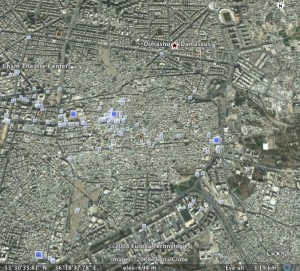Why do they look for Bashar’s good side?
Shame on the International Crisis Group, which I generally admire, for Peter Harling’s “time is running out” nonsense published yesterday on foreignpolicy.com yesterday:
Time is running out as every new casualty makes the clock tick faster. To open the space required for a radical reform agenda to take hold, the regime’s top priority must be to ensure a period of relative calm. Prospects will look grim were the country to witness yet another bloody Friday.
How come time has not already run out? The country has seen at least two bloody Fridays already. The Syrian regime has spent the past couple of weeks beating and killing demonstrators.
Maybe Harling should re-read his own material. He wrote on March 30 about Bashar al Assad:
…his much-anticipated speech has failed to offer a credible alternative. There is now every likelihood that Syrians, their hopes dashed, will again take to the streets. The regime must pass this last test, which is to avoid more bloodshed. Repression could help it survive or it could be tantamount to suicide — but in either case, it would be an ignominious fate.
What is it about Bashar al Assad that makes Western commentators want to think the best of him? Why is it that after 12 days of failing a test Bashar is told he can still pass it? Hasn’t he made it clear enough that he is uninterested in any sort of reform that threatens his own hold on power, much less radical reform of any sort?
I’m puzzled by this need to imagine that somehow there is a positive side of the Syrian regime we just haven’t seen yet. Can there be any doubt that the regime will seek to stay in power, spending whatever resources it can assemble and sacrificing whatever ideology or political groups may stand in the way? Has there been the slightest sign of willingness to engage in genuine political reform?
The problem is not, as Harling supposes, lack of communication or interlocutors on either side. The problem is a regime that has shut the door on political competition, genuine economic reform and openness to much of the world. The solution lies with the Syrian people, who seem to me to be doing their best under difficult circumstances. I’d have expected more sympathy for their perspective from ICG. For a genuine cry for freedom, from Syrian writer and political activist Yassin al-Haj Saleh, see this from the New York Times. That is where ICG’s heart and head should be.
PS: Here is some of the latest on the Syrian crackdown. For more detail, see Syria Comment. Or try this, reporting that Syrian soldiers have been shot for refusing to fire on protesters. Imagine what we might find out if foreign journalists were allowed in!
PPS: Joshua Landis has published evidence that the allegation of Syrian soldiers having been shot for refusing to fire on protesters is untrue.
One thought on “Why do they look for Bashar’s good side?”
Comments are closed.





 RSS - Posts
RSS - Posts

Maybe it’s not Bashar but worries about what would happen to the region if Syria turned into Lebanon? And do we as a country even want true popular governments in the region? So far, the young, educated protesters have been telling Western governments what they want to hear, maybe what they themselves believe, but when the government changes and populist politicians start calling for, say, pushing the Israelis into the sea, will we regret the loss of the strongmen who at least were willing to play along with our interests for their own purposes? Until they rewrite the textbooks in some of these countries, democratic governments may be dangerous for the rest of the world.
And didn’t the ICG call for autonomy for northern Kosovo a while back? Sounds like trading some temporary problems for a permanent one. I thought people were pretty much agreed that Republika Srpska was a bad idea at the time and is getting worse. Are they promoting Permanent Crisis as a solution for Kosovo?